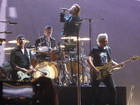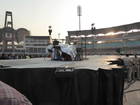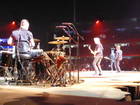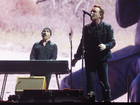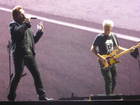U2 mixes spectacle and emotion in Glendale
(The Arizona Republic) -- Irish supergroup U2 has staged spectacles for years, and Thursday's installment of its "Vertigo" tour at Glendale Arena certainly had its bells and whistles.
Most impressive on the visual front was the use of huge beaded "light curtains" that could programmed like a stadium scoreboard on steroids to flash colors, words or -- during a call for world unity by politically outspoken singer Bono -- a waterfall of flags from around the globe.
The band used an elliptical stage similar to the heart-shaped number employed last time out, enabling Bono and guitarist the Edge, bassist Adam Clayton and drummer Larry Mullen Jr. to strut far out into the arena's floor, with a group of lucky fans mulling about in the middle of it all. The stage was ringed with an array of lights used to set all types of moods.
Although Thursday's concert had its share of fun moments, it was more about a band exploring new ways to present its 25-year-old catalog and, just as important, the messages behind that music. (U2 returns to the arena tonight for a second sold-out show.)
So before the band could tear into a glitzy, laser-guided version of its iPod-friendly anthem, "Vertigo," it opened the evening with "Love and Peace or Else," from its latest album, "How to Dismantle an Atomic Bomb." "Lay down your guns, all your daughter of Zion, all your Abraham sons," Bono sang, standing with his bandmates at the farthest reach of the catwalk. The singer, who turns 45 next month, still has plenty on his mind after decades of writing and performing, and he acted out plenty of it in Glendale.
The band kept things a bit lighter for the first half of the set. The audience, which stood for 98 percent of the concert, needed no prodding to sing along in 2000's "Elevation," while the tune was given a slightly stripped and funkified treatment by the Edge, Clayton and Mullen.
Bono crawled around the stage on all fours and then played to fans' cameras as U2 performed what he called "a song from a long time ago" - "The Electric Company," from its 1980 debut album, "Boy." The blissful looks on the faces of those fans near him and the sea of outstretched arms were reminders that there may not be a more magnetic and well-loved front man in rock and roll today.
The new "City of Blinding Lights" was uplifting both sonically and lyrically, with Bono singing, "Oh, you look so beautiful tonight" as the crowd was bathed in bright light.
But Bono & Co. summoned the most emotion for a six-song sequence that closed the main portion of the concert. Starting with the anti-war sentiment of 1984's "New Year's Day," the band took aim at the folly of war ("We're so sick of it!," Bono screamed during "Sunday Bloody Sunday," which had heavier, more aggressive guitar work than usual) and the costs of those battles (One of the evening's several small interludes had Bono singing "When Johnny Comes Marching Home" in a voice full of melancholy). The singer drew huge applause by dedicating one song to "the brave women of the United States military," but the selection was 1987's "Running to Stand Still."
Human rights and poverty took center stage as the band projected excerpts from a 1948 United Nations proclamation calling for global equality and condemning torture, abuse and slavery during "Running To Stand Still." Audience members were asked to use the text-messaging systems on their cell phones to sign up for a campaign to fight poverty during "One," which also was had a more funky edge.
During the still-powerful "(Pride) In the Name of Love," Bono couldn't resist reminding Arizonans about 1987, when the band issued a statement during a visit here blasting Gov. Evan Mecham for revoking the state's Martin Luther King Jr. holiday. "Remember, Arizona, when there wasn't a Dr. King Day?," he asked. "This is a better day. Dr. King's dream was big enough to fit the whole world."
Despite the high-tech glitz and the politics, U2 seems more reserved on this tour, both musically and in the way its members moved about the stage. Performances of such hist as "Mysterious Ways," "New Year's Day" and "Where the Streets Have No Name" sounded earthy and economical, and that was just fine.
Perhaps after the emotional drain of its last American tour, when the names of those who died in the Sept. 11 terrorist attacks were projected on the walls and ceilings of arenas, U2 felt that a slightly more low-key approach was warranted this time out.
Or it could be that U2 is settling into an elder statesman's role in the world of bands that can still really rock and are still very relevant (that's a pretty small world, by the way).
But no matter how it tweaks each global outing, U2 remains one of the most awe-inspiring forces on the rock stage today. And Thursday's powerful, poignant performance was no exception.
© Larry Rodgers
The Arizona Republic
Most impressive on the visual front was the use of huge beaded "light curtains" that could programmed like a stadium scoreboard on steroids to flash colors, words or -- during a call for world unity by politically outspoken singer Bono -- a waterfall of flags from around the globe.
The band used an elliptical stage similar to the heart-shaped number employed last time out, enabling Bono and guitarist the Edge, bassist Adam Clayton and drummer Larry Mullen Jr. to strut far out into the arena's floor, with a group of lucky fans mulling about in the middle of it all. The stage was ringed with an array of lights used to set all types of moods.
Although Thursday's concert had its share of fun moments, it was more about a band exploring new ways to present its 25-year-old catalog and, just as important, the messages behind that music. (U2 returns to the arena tonight for a second sold-out show.)
So before the band could tear into a glitzy, laser-guided version of its iPod-friendly anthem, "Vertigo," it opened the evening with "Love and Peace or Else," from its latest album, "How to Dismantle an Atomic Bomb." "Lay down your guns, all your daughter of Zion, all your Abraham sons," Bono sang, standing with his bandmates at the farthest reach of the catwalk. The singer, who turns 45 next month, still has plenty on his mind after decades of writing and performing, and he acted out plenty of it in Glendale.
The band kept things a bit lighter for the first half of the set. The audience, which stood for 98 percent of the concert, needed no prodding to sing along in 2000's "Elevation," while the tune was given a slightly stripped and funkified treatment by the Edge, Clayton and Mullen.
Bono crawled around the stage on all fours and then played to fans' cameras as U2 performed what he called "a song from a long time ago" - "The Electric Company," from its 1980 debut album, "Boy." The blissful looks on the faces of those fans near him and the sea of outstretched arms were reminders that there may not be a more magnetic and well-loved front man in rock and roll today.
The new "City of Blinding Lights" was uplifting both sonically and lyrically, with Bono singing, "Oh, you look so beautiful tonight" as the crowd was bathed in bright light.
But Bono & Co. summoned the most emotion for a six-song sequence that closed the main portion of the concert. Starting with the anti-war sentiment of 1984's "New Year's Day," the band took aim at the folly of war ("We're so sick of it!," Bono screamed during "Sunday Bloody Sunday," which had heavier, more aggressive guitar work than usual) and the costs of those battles (One of the evening's several small interludes had Bono singing "When Johnny Comes Marching Home" in a voice full of melancholy). The singer drew huge applause by dedicating one song to "the brave women of the United States military," but the selection was 1987's "Running to Stand Still."
Human rights and poverty took center stage as the band projected excerpts from a 1948 United Nations proclamation calling for global equality and condemning torture, abuse and slavery during "Running To Stand Still." Audience members were asked to use the text-messaging systems on their cell phones to sign up for a campaign to fight poverty during "One," which also was had a more funky edge.
During the still-powerful "(Pride) In the Name of Love," Bono couldn't resist reminding Arizonans about 1987, when the band issued a statement during a visit here blasting Gov. Evan Mecham for revoking the state's Martin Luther King Jr. holiday. "Remember, Arizona, when there wasn't a Dr. King Day?," he asked. "This is a better day. Dr. King's dream was big enough to fit the whole world."
Despite the high-tech glitz and the politics, U2 seems more reserved on this tour, both musically and in the way its members moved about the stage. Performances of such hist as "Mysterious Ways," "New Year's Day" and "Where the Streets Have No Name" sounded earthy and economical, and that was just fine.
Perhaps after the emotional drain of its last American tour, when the names of those who died in the Sept. 11 terrorist attacks were projected on the walls and ceilings of arenas, U2 felt that a slightly more low-key approach was warranted this time out.
Or it could be that U2 is settling into an elder statesman's role in the world of bands that can still really rock and are still very relevant (that's a pretty small world, by the way).
But no matter how it tweaks each global outing, U2 remains one of the most awe-inspiring forces on the rock stage today. And Thursday's powerful, poignant performance was no exception.
© Larry Rodgers
The Arizona Republic
Posted on by Macphisto
